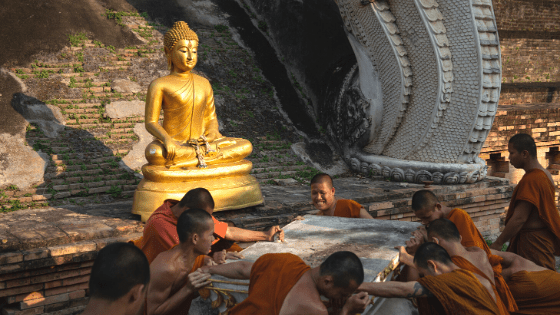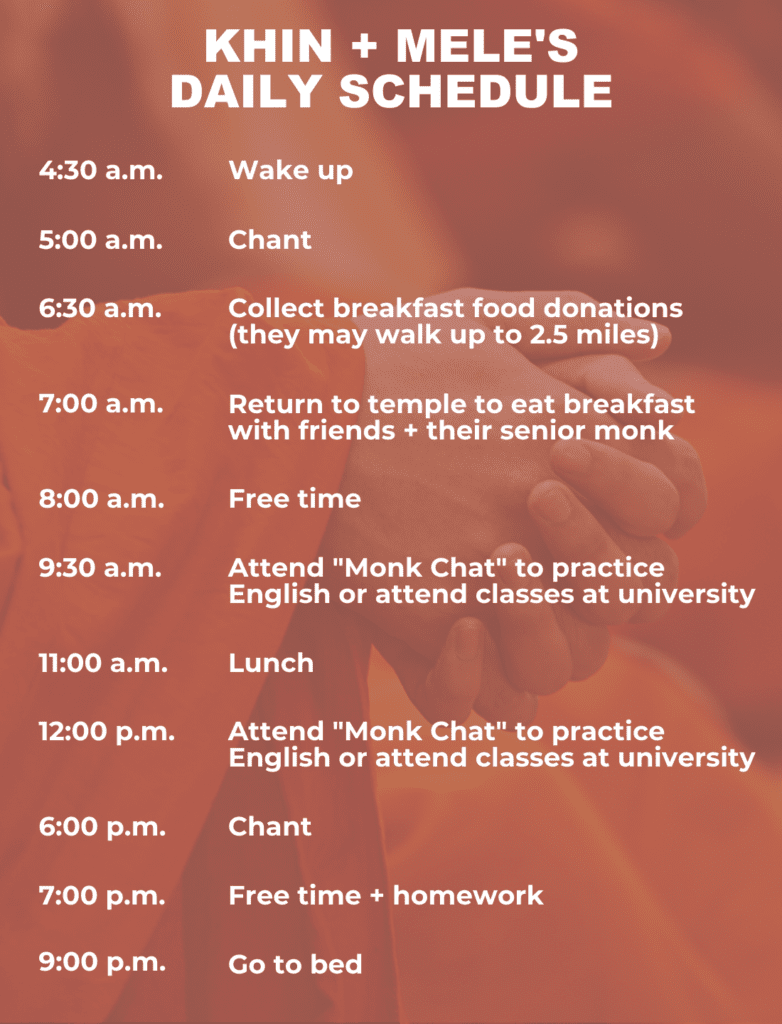by Katie Archibald-Woodward, multimedia storyteller + ministry friend
Frontier Fellowship’s staff, along with a board member and some family members, traveled to Thailand and Myanmar in January to discover together how the Good News of Jesus is being made known to people groups in this part of the Buddhist world. Here, multimedia storyteller and ministry friend Katie Archibald-Woodward shares about her experience chatting with two monks.
As the sun dips low and the shadows of Wat Chedi Luang stretch across the pavement, we settle into nearby picnic tables for a chat with local Buddhist monks. A young man in his early 20s with a certain gentleness and easily triggered smile sits down with us. Khin, as he introduces himself, is originally from Myanmar and lives at a temple in Chiang Mai where he is devoted to being a monk and studying English at the university. His friend Mele, from Laos, joins us moments later. He’s earning his degree in English as well. They’re as eager to practice English as we are curious about their lives as Buddhist monks. Here are some of the highlights of our conversation.
Why did you become a monk?
“It’s like a tradition,” says Khin. “My parents wanted me to become a monk. Every boy who is a Buddhist has to—for a short time or long time.” It seems being a monk is something of a rite of passage for young Buddhist men. By participating in Buddhist monastery life, men earn spiritual merit and bring honor to their families. They also receive free education in exchange for their service. They may remain monks anywhere from two to four years, or decide to devote their lives to it. Neither Khin nor Mele think they will remain life-long monks. Instead, Khin dreams of a vocation like, “something with computers…or tour guide! This is why I want to learn English.” We all smile—he has the charisma for it!
What happens when you chant?
“You concentrate,” Mele said. “The chanting helps you be in the present moment and reconnect you when your mind begins to run away with passing thoughts and images. It brings a sense of calm.” He added, “We pray to Buddha.”
Why do you meditate and how?
“We practice meditation in hopes of achieving enlightenment, or to be reincarnated in a better position than our previous life.” To practice, Khin and Mele said they might focus on one word or concentrate on the expansion and contraction of their abdomen with each breath.
What is the most important thing for someone to know about Buddhism?
“To learn to be satisfied and to practice kindness.”
What has your experience been like as a monk?
“Maybe before I became a monk, I was aggressive,” Khin reflects. “It’s easy for me to get angry and lose control of my emotions. Our elders teach us how to be good monks. How to control the mind and emotions.” It was evident. He seemed light-hearted and so at ease in himself.
Upon our own reflections, Executive Director Richard Haney observed, “Many concepts and teachings overlap between Buddhism and Christianity, but there are many distinctions as well. Buddhism seems to place a high value on doing good works to earn merit. Christianity, by contrast, emphasizes human dependence on God’s mercy and grace for salvation. Good works, in the Christian faith, are intended to be a natural response to God’s gift of eternal life and one’s relationship with the Living God.” One church planter agreed, “The idea of a personal, relational God is so foreign to most Buddhists. Once people understand that, Jesus is a whole lot easier for them to receive.” It’s the concept of a Living God that is drawing Buddhists to Christ.
It was a heart-opening experience to be with these two young monks. It was a joy to learn from them about Buddhism and now to be able to pray for them. We pray they continue to experience the Living God in the people they meet, their practices and their studies, that they may enjoy the One who brings fullness of life now and eternally.
Read more about Frontier Fellowship’s vision trip to Southeast Asia in the spring issue of The Frontier Journal.



Comments are closed.